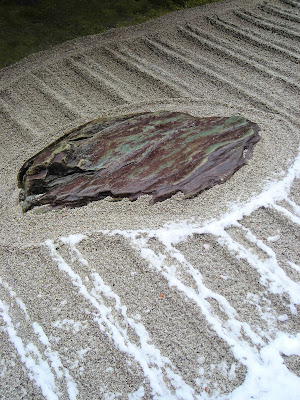Christmas Eve, 2009
I wasn't going to post this but since this is the season of giving, here's a piece about a gift. And one more mystifying than three wise men popping up in a maternity ward. (The companion post is below.)
...
Mukai Kyorai was a poet with a plan.
In the garden of his cottage on the outskirts of Kyoto city were 40 persimmon trees. Their branches were hung with fruit ripening orange but he couldn’t possibly eat it all. And since fruit preserves had not been discovered in 17th century Japan, he couldn’t make jam either.
So he promised to sell the persimmons to a merchant from the city, receiving payment in advance. But that night, a storm blew up and in the darkness of his cottage, Kyorai heard things smacking the roof and plopping to the ground.
The next day, when the merchant returned, Kyorai was forced to give him his money back because most of the persimmons had fallen in the storm.
Kyorai does not seem to have been upset. He got a poem out of the experience and, because the storm had stripped the tree branches bare, a clear view of a nearby mountain. Some say he even achieved enlightenment.
In any case, he renamed his cottage Rakushisha – House of Fallen Persimmons – and an 18th century reconstruction still stands in the Saga district of Kyoto today. Many of those who visit are drawn by the connection with haiku giant Matsuo Basho: Kyorai was one of his chief disciples and played host to his teacher there.
But the story behind the hut’s name also catches at the mind because it overturns our expectations of how things should play out. The prospect of profit, a sudden storm and a destroyed crop: it should all end badly.
Underlying these expectations is the belief that nothing good can come from a fall. This belief is hardwired in the words we speak: ‘a fallen woman’, ‘fall into enemy hands’, ‘fall in battle’, ‘drop in sales’, ‘plummeting rankings’. To fall is to succumb to temptation or attack, to lose status, popularity or money. To fall is to become less.
Many of these expressions are found in Japanese and English. And they share another one: in both languages, you encounter love by falling in it. You don’t dance, skip or jump into love – you fall. Even if you land safely, the choice of words still betrays dismay at the powerlessness felt.
Our evolution – both as individuals and a species – is geared towards walking upright. If all goes well, we graduate from toddling to walking to running and to riding a bike. Falling is what happens when we fail. If we fall hard enough and in the wrong place, it ends in mud and blood.
This may explain our prejudice against the act, a prejudice revealed in yet another expression: fall from grace – a loss of someone’s good opinion.
Yet there is a different kind of grace though it also involves a fall. This is favour we have not earned, a gift that comes not because of something we have done or are expected to do but entirely because of the nature of the giver.
Landing like a fist in the gut, it knocks us off our feet. We build relationships and societies on ideas of reciprocity and contract. But to grace, our considered balances and agreements, spoken and unspoken, are a house of cards. It smiles – and blows.
So mystifying is grace that it is usually left to the divine. In human hands, giving is something that must be justified. If a present appears at an occasion other than a birthday or holiday, so will these words: ‘What’s this for?’
In human hands, giving must be explained, even if it’s with something as simple as ‘I saw this and thought of you’.
Gifts for no apparent reason terrify: like shopping with a credit card for things without price tags – you can’t relax until you’ve seen the size of the bill.
Not even charity comes close to grace. When you donate money, you expect it to be spent in certain ways rather than on, say, lap dancers. But grace gives much and asks nothing, not even a thank you.
How then to respond? You can always say, no thanks, and walk away. You can take grace for granted, which is accepting with your eyes closed. Or you can keep your eyes open and with hands held steady, receive.

But the last option is also the hardest because it means being prepared to fall. Like a storm that brings down promised persimmons, grace upsets expectations. Will you, like Kyorai the poet, then be able to step off the path of logical action and accustomed thought? Without knowing what lies at the bottom – it could be a poem, a view of a mountain, enlightenment or none of them – could you dive into the dark?
If your foot goes to the edge of the path then hesitates, it may be too soon for that final plunge. Practise with a less demanding tumble, a kind of Grace Lite.
It’s something easily found in the natural world and there’s a particularly nice example in the mountains northwest of Kyoto city. The Iwato Ochiba shrine is tiny, like the remote community it serves, but soaring gingko trees tower over it and in late autumn, they shower the shrine with yellow, fan-shaped leaves.
The moss and flagstones disappear under the gilt and the little wooden stage in the centre of the shrine floats in a sea of yellow.
I try to leave a donation but the access to the main building is closed off and the shrine deserted. Asked for nothing, giving nothing, I still walk on gold.
The wind breathes out and more gold leaf drifts down. It’s a fall that comes from grace – a fall, if you like, from grace.


No comments:
Post a Comment